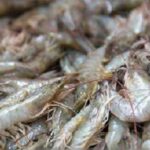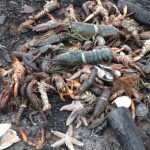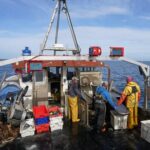Tag Archives: escaped Atlantic salmon
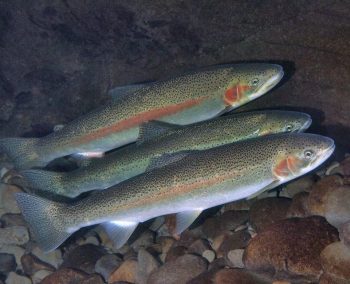
Still recovering from escaped Atlantic salmon, Cooke Aquaculture now wants to farm steelhead
In August 2017, at least 263,000 farmed Atlantic salmon escaped from Cooke Aquaculture’s net pens at Washington’s Cypress Island into Washington state waters. The incident launched a legislated process to phase out nonnative finfish farming in Washington by 2025, and a $332,000 fine for Cooke Aquaculture, a Canadian multinational seafood company. As Cooke sunsets its Atlantic salmon farming in the state, it has experienced at least two viral outbreaks impacting more than 1 million fish; and was fined for more water quality violations. But not quite two years since the disaster, >click to read< 12:21
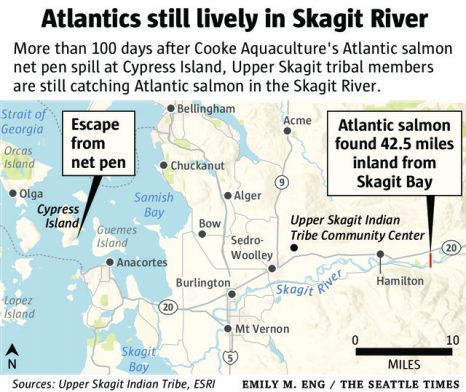
Escaped Atlantic salmon found 42 miles up Skagit River
Strong, silvery and feisty, the Atlantic salmon hit the boat deck, thrashing and thumping. It was the sixth one the Upper Skagit Indian fishing crew caught that day. More than three months after a massive escape of Atlantic salmon from Cooke Aquaculture’s net pen at Cypress Island, Atlantics are still turning up very much alive in the Skagit River, one of Washington’s premier Pacific salmon strongholds.,, Caught more than 42 miles up the Skagit in a brief fishery in just a short stretch of river, those Atlantics were surely not the only ones in the river or the region, said Scott Schuyler, natural-resources director for the Upper Skagit Indian Tribe, based in Sedro-Woolley. 11 photo’s click here to read the story 18:19
Everyone’s Mad About Fugitive Salmon in the Pacific Northwest!
 In a giant refrigerated warehouse 90 miles north of Seattle, 43,500 Atlantic salmon were stacked in plastic crates, frozen pariahs in a kingdom where Pacific salmon rule. For weeks, locals used nets to chase down the intruders, not to eat them or sell them, but to get them out of the water. Native fishermen who’ve worked Puget Sound for decades mocked them for looking different. Chefs and foodies refused to so much as lay a boning knife on them. Scientists, for their part, say they’re perfectly edible — a good source of protein in a world where increasing numbers of people could use some. But nobody is listening. click here to read the story 09:01
In a giant refrigerated warehouse 90 miles north of Seattle, 43,500 Atlantic salmon were stacked in plastic crates, frozen pariahs in a kingdom where Pacific salmon rule. For weeks, locals used nets to chase down the intruders, not to eat them or sell them, but to get them out of the water. Native fishermen who’ve worked Puget Sound for decades mocked them for looking different. Chefs and foodies refused to so much as lay a boning knife on them. Scientists, for their part, say they’re perfectly edible — a good source of protein in a world where increasing numbers of people could use some. But nobody is listening. click here to read the story 09:01



































